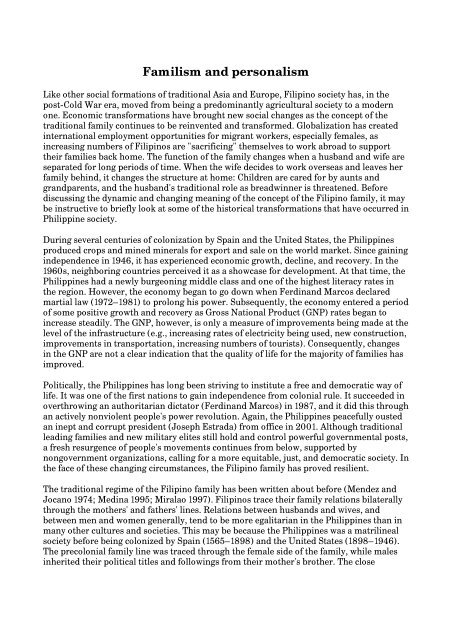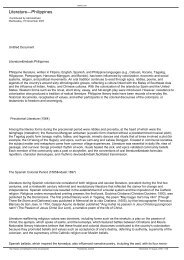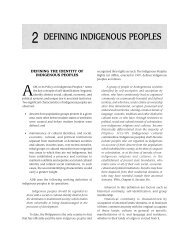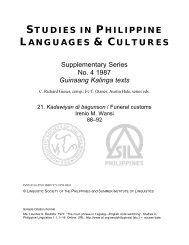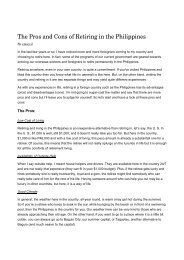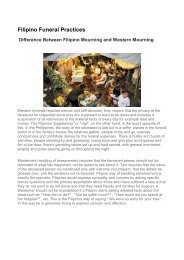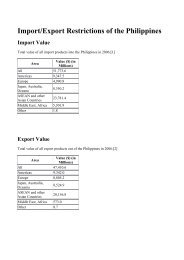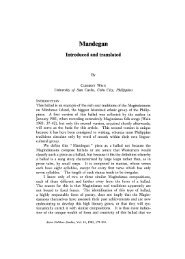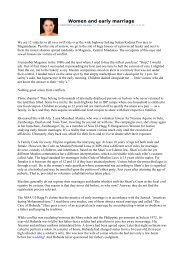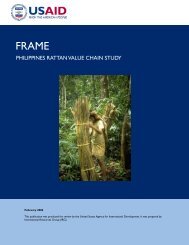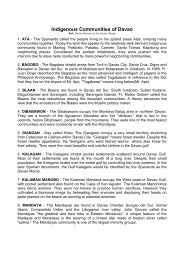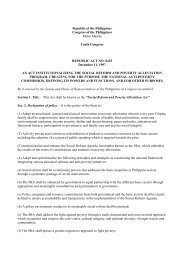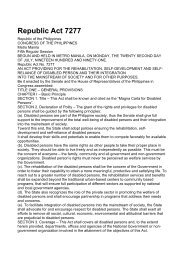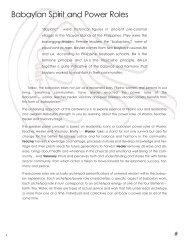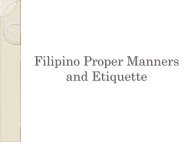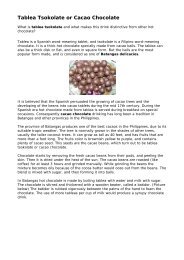Familism and personalism - Philippine Culture
Familism and personalism - Philippine Culture
Familism and personalism - Philippine Culture
Create successful ePaper yourself
Turn your PDF publications into a flip-book with our unique Google optimized e-Paper software.
<strong>Familism</strong> <strong>and</strong> <strong>personalism</strong>Like other social formations of traditional Asia <strong>and</strong> Europe, Filipino society has, in thepost-Cold War era, moved from being a predominantly agricultural society to a modernone. Economic transformations have brought new social changes as the concept of thetraditional family continues to be reinvented <strong>and</strong> transformed. Globalization has createdinternational employment opportunities for migrant workers, especially females, asincreasing numbers of Filipinos are "sacrificing" themselves to work abroad to supporttheir families back home. The function of the family changes when a husb<strong>and</strong> <strong>and</strong> wife areseparated for long periods of time. When the wife decides to work overseas <strong>and</strong> leaves herfamily behind, it changes the structure at home: Children are cared for by aunts <strong>and</strong>gr<strong>and</strong>parents, <strong>and</strong> the husb<strong>and</strong>'s traditional role as breadwinner is threatened. Beforediscussing the dynamic <strong>and</strong> changing meaning of the concept of the Filipino family, it maybe instructive to briefly look at some of the historical transformations that have occurred in<strong>Philippine</strong> society.During several centuries of colonization by Spain <strong>and</strong> the United States, the <strong>Philippine</strong>sproduced crops <strong>and</strong> mined minerals for export <strong>and</strong> sale on the world market. Since gainingindependence in 1946, it has experienced economic growth, decline, <strong>and</strong> recovery. In the1960s, neighboring countries perceived it as a showcase for development. At that time, the<strong>Philippine</strong>s had a newly burgeoning middle class <strong>and</strong> one of the highest literacy rates inthe region. However, the economy began to go down when Ferdin<strong>and</strong> Marcos declaredmartial law (1972–1981) to prolong his power. Subsequently, the economy entered a periodof some positive growth <strong>and</strong> recovery as Gross National Product (GNP) rates began toincrease steadily. The GNP, however, is only a measure of improvements being made at thelevel of the infrastructure (e.g., increasing rates of electricity being used, new construction,improvements in transportation, increasing numbers of tourists). Consequently, changesin the GNP are not a clear indication that the quality of life for the majority of families hasimproved.Politically, the <strong>Philippine</strong>s has long been striving to institute a free <strong>and</strong> democratic way oflife. It was one of the first nations to gain independence from colonial rule. It succeeded inoverthrowing an authoritarian dictator (Ferdin<strong>and</strong> Marcos) in 1987, <strong>and</strong> it did this throughan actively nonviolent people's power revolution. Again, the <strong>Philippine</strong>s peacefully oustedan inept <strong>and</strong> corrupt president (Joseph Estrada) from office in 2001. Although traditionalleading families <strong>and</strong> new military elites still hold <strong>and</strong> control powerful governmental posts,a fresh resurgence of people's movements continues from below, supported bynongovernment organizations, calling for a more equitable, just, <strong>and</strong> democratic society. Inthe face of these changing circumstances, the Filipino family has proved resilient.The traditional regime of the Filipino family has been written about before (Mendez <strong>and</strong>Jocano 1974; Medina 1995; Miralao 1997). Filipinos trace their family relations bilaterallythrough the mothers' <strong>and</strong> fathers' lines. Relations between husb<strong>and</strong>s <strong>and</strong> wives, <strong>and</strong>between men <strong>and</strong> women generally, tend to be more egalitarian in the <strong>Philippine</strong>s than inmany other cultures <strong>and</strong> societies. This may be because the <strong>Philippine</strong>s was a matrilinealsociety before being colonized by Spain (1565–1898) <strong>and</strong> the United States (1898–1946).The precolonial family line was traced through the female side of the family, while malesinherited their political titles <strong>and</strong> followings from their mother's brother. The close
societies modernize, social relationships become more impersonal <strong>and</strong> businesslike. At thesame time, Durkheim <strong>and</strong> Weber characterized modern societies as being less religiouslyoriented <strong>and</strong> more scientifically grounded. <strong>Philippine</strong> society, however, does not work inaccordance with Western-derived notions of modernization, although such modelscontinue to dominate development circles. Although society is indeed becomingcharacterized by more impersonal relationships, popular religious <strong>and</strong> social movementsfor an alternative, holistic development paradigm are widespread <strong>and</strong> growing stronger.Moreover, the modern Filipino family continues to be close knit <strong>and</strong> centered on thefamily. Relationships among extended kin continue to be marked by reciprocal obligations<strong>and</strong> privileges even across great geographic distances.<strong>Familism</strong> <strong>and</strong> <strong>personalism</strong> are all-pervasive in <strong>Philippine</strong> society. Filipinos typically try tomake their friendships into family-like relationships that are mutually supportive. Theyprefer to have smooth interpersonal relationships with one another <strong>and</strong> go out of their wayto create an atmosphere in which the people around them feel comfortable <strong>and</strong> accepted.Filipinos generally try to avoid confrontations <strong>and</strong> make use of indirect speech <strong>and</strong>mediators in situations of potential conflict. As elsewhere in Asia, there is a strong conceptof face in the <strong>Philippine</strong>s. This means that Filipinos are taught to be sensitive to otherpeople's feelings <strong>and</strong>, generally, do not say words that may embarrass or shame a fellowhuman.Filipino parents consider it their duty to provide for the material <strong>and</strong> educational needs oftheir children. Children, in turn, are expected to obey <strong>and</strong> respect their parents <strong>and</strong> to takecare of their parents when they grow old. Also, older children, until they marry <strong>and</strong> havefamilies of their own, are expected to help younger siblings with school, <strong>and</strong> to assist themin getting a job after graduation.Beginning in the 1970s, the <strong>Philippine</strong> government implemented an overseas employmentprogram to absorb the increasing numbers of Filipino workers. This has led to newconceptualizations of the Filipino family <strong>and</strong> changing gender roles, as many marriedfemales have decided to migrate abroad to work, <strong>and</strong> their husb<strong>and</strong>s stay home to care forthe children. Today, most Filipino families are maintaining <strong>and</strong> reproducing transnationalhousehold connections <strong>and</strong> networks. The Filipino family continues to be adaptive <strong>and</strong>functional in these new <strong>and</strong> changing circumstances.Ref.: http://family.jrank.org/pages/1277/<strong>Philippine</strong>s.html


